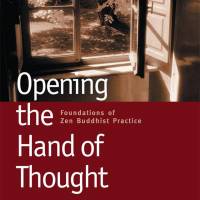Good books on Zen urge you to put them down and start meditating, but the best ones make you actually want to.
Opening the Hand of Thought: Foundations of Zen Buddhist Practice, by Kosho Uchiyama, Translated and edited by Tom Wright, Jisho Warner and Shohaku Okumura.
205 pages
WISDOM PUBLICATIONS, Nonfiction.
In "Opening the Hand of Thought," the monk Kosho Uchiyama outlines his school's take on the middle way. Employing deft analogies and pertinent anecdotes he presents the Soto case for seated meditation, called zazen, as a direct way of getting in touch with the self "that goes beyond personal consciousness."
Uchiyama frequently references great minds from the Christian and Rinzai Zen traditions and his direct, honest prose unfolds in a natural way that is neither dry nor pretentious.
There are concrete tips for beginners as well as ripe, time-release advice for experienced sitters, culminating in the last chapter with a transcription of the final lecture Uchiyama gave before retiring as abbot of Antaiji Temple in 1975.
The theme of nonattachment underlies this book and is key to its title. Rather than struggling in vain to somehow not have thoughts during meditation, Uchiyama advises ceasing to grasp at the inevitable thoughts and instead observing them like clouds, a kind of mental weather.
As a nudge toward starting regular zazen practice, which is all any book on this ineffable topic really can be, this one has staying power.


















With your current subscription plan you can comment on stories. However, before writing your first comment, please create a display name in the Profile section of your subscriber account page.